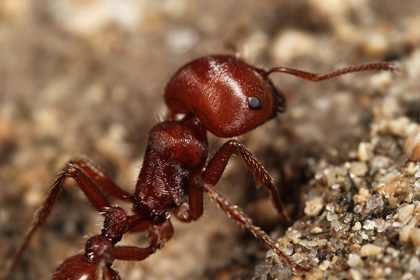
Deborah Gordon is a biologist at Standford who has spent the last 20 years studying ants. Each to their own, I say. She pooled her lot with computer scientist Balaji Prabhakar (also at Standford) and the pair have revealed a connection between how harvester ants behave as they search for food and Internet protocol.
According to Prabhakar: ‘The algorithm the ants were using to discover how much food there is available is essentially the same as that used in the Transmission Control Protocol.’
SearchNetworking defines TCP as ‘a set of rules (protocol) used along with the Internet Protocol (IP) to send data in the form of message units between computers over the Internet. While IP takes care of handling the actual delivery of the data, TCP takes care of keeping track of the individual units of data (called packets) that a message is divided into for efficient routing through the Internet’.

The work is published in the Aug. 23 issue of PLoS Computational Biology.
Image © David Louis Quinn/Pogolumina


